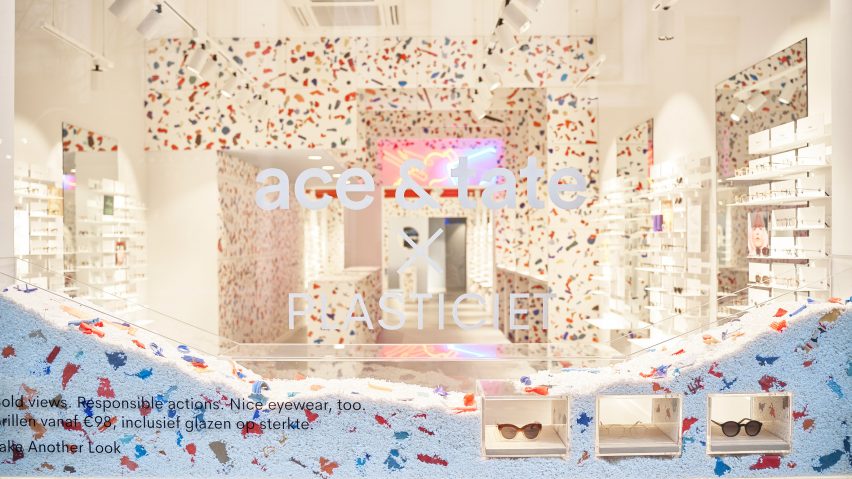Amsterdam-based eyewear company Ace & Tate's shop in Antwerp has interiors clad with terrazzo made with colourful chips of recycled plastic sourced locally by Dutch startup Plasticiet.
Ace & Tate collaborated with sustainable materials company Plasticiet for the shop in Belgium as part of their push to become more sustainable.
The brand has pledged to become carbon neutral by 2030, and by the end of this year all of their glasses will be made from 100 per cent bio acetate – recyclable acetate mixed with bio-based plasticisers instead of oil based.
Plasticiet, founded by designers Marten van Middelkoop and Joost Dingemans, collects plastic waste and turns it into sheets of material that look like traditional stone such as marble and granite.
For the Antwerp Ace & Tate they created a terrazzo effect with large chips of bright blues, reds, yellows and green.
"The recycled plastic we used is polyethylene, a very common material that finds many uses in industrial and construction appliances as well as domestic products such as food packaging, kitchen ware and toys," Dingemans told Dezeen.
The plastic was all collected from the local area by recycling company Suez, which uses infrared light to sort the waste. Plasticiet picked out the pieces they wanted to create an attractive colour combination. They used nearly 1,000 kilograms for the project.
"Compared to the white base material, which used to be food packaging, the reclaimed plastic from Antwerp becomes less viscous during the melting process allowing the chunky pieces to retain their shape during production," added Dingeman.
"This way most of the chunks remain their initial shape and the viewers can indulge themselves into finding products they know."
Panels of plastic terrazzo cover the walls, arches, shelves and counters of the shop. In the window a clear plastic box is filled with tiny white chips of recycled plastic mixed in with larger coloured pieces.
This visual representation of the recycling process is punctuated with display boxes for the glasses and sunglasses, creating an attractive and informative window display.
"We want to inspire others to find long term appliances for materials that are reusable or recyclable rather than misusing the world’s precious materials by readily disposing of them," said Dingeman.
Terrazzo booths with mirrored interiors above a shelve provide convenient places for shoppers to try on different glasses.
Neon lighting, a signature of Ace Tate's shops, was used throughout the Antwerp store's interior. The brand's store in London's Soho area features a pair of glowing neon eyes as an allusion to voyeurism in a red light district. A cascading neon sign spelling out a slogan decorates Ace & Tate Copenhagen, which is coloured in blocks of bright primary colours.
Designers are turning to recycled plastic to try and reduce the demand for virgin plastic as awareness about the environmental destruction associated with the petrochemical industry grows.
Australian designer Brodie Neill has created furniture and sculptures made with what he calls ocean terrazzo, from chips of plastic set in resin.
Antwerp-based brand Ecobirdy makes furniture for children from old plastic toys to teach them about recycling.
Photography is by Lennart Wiedemuth.

